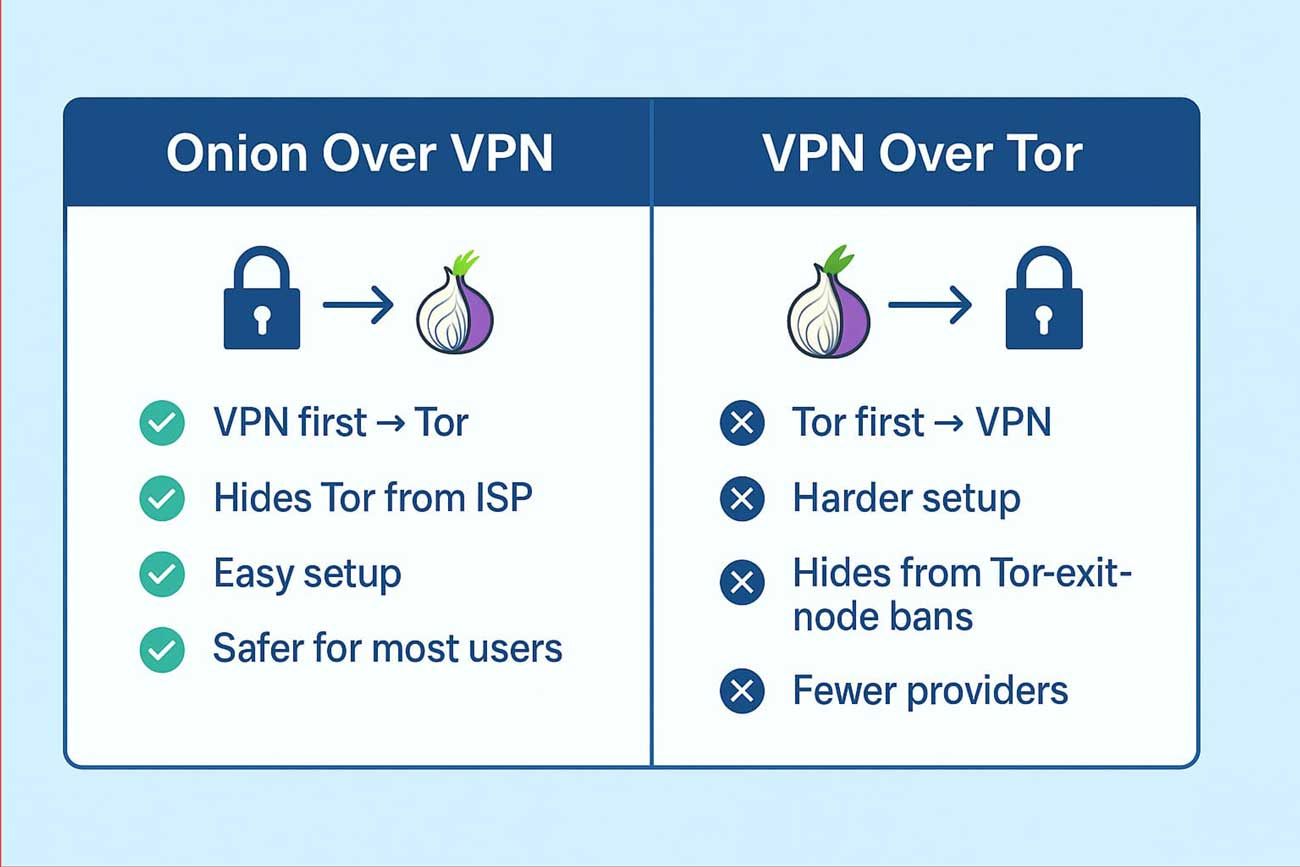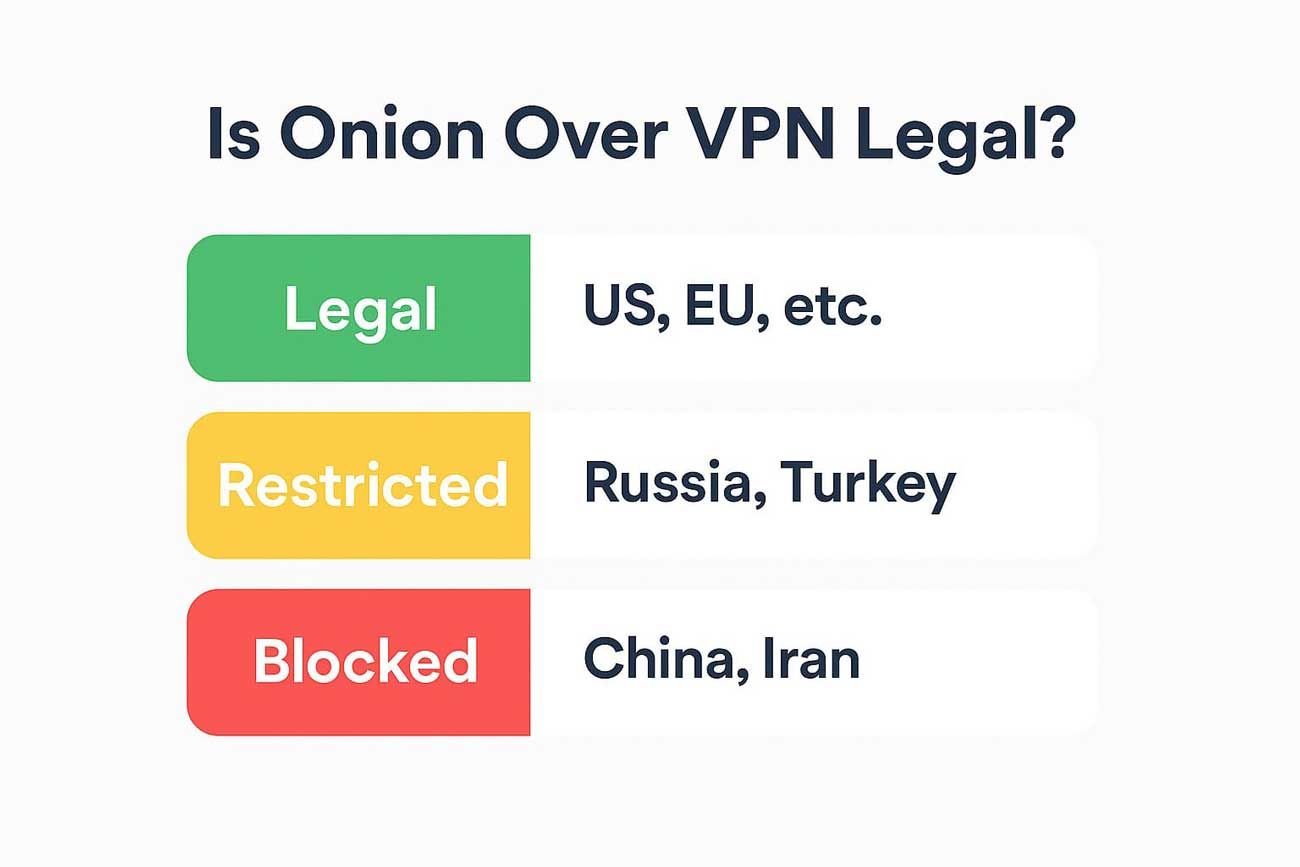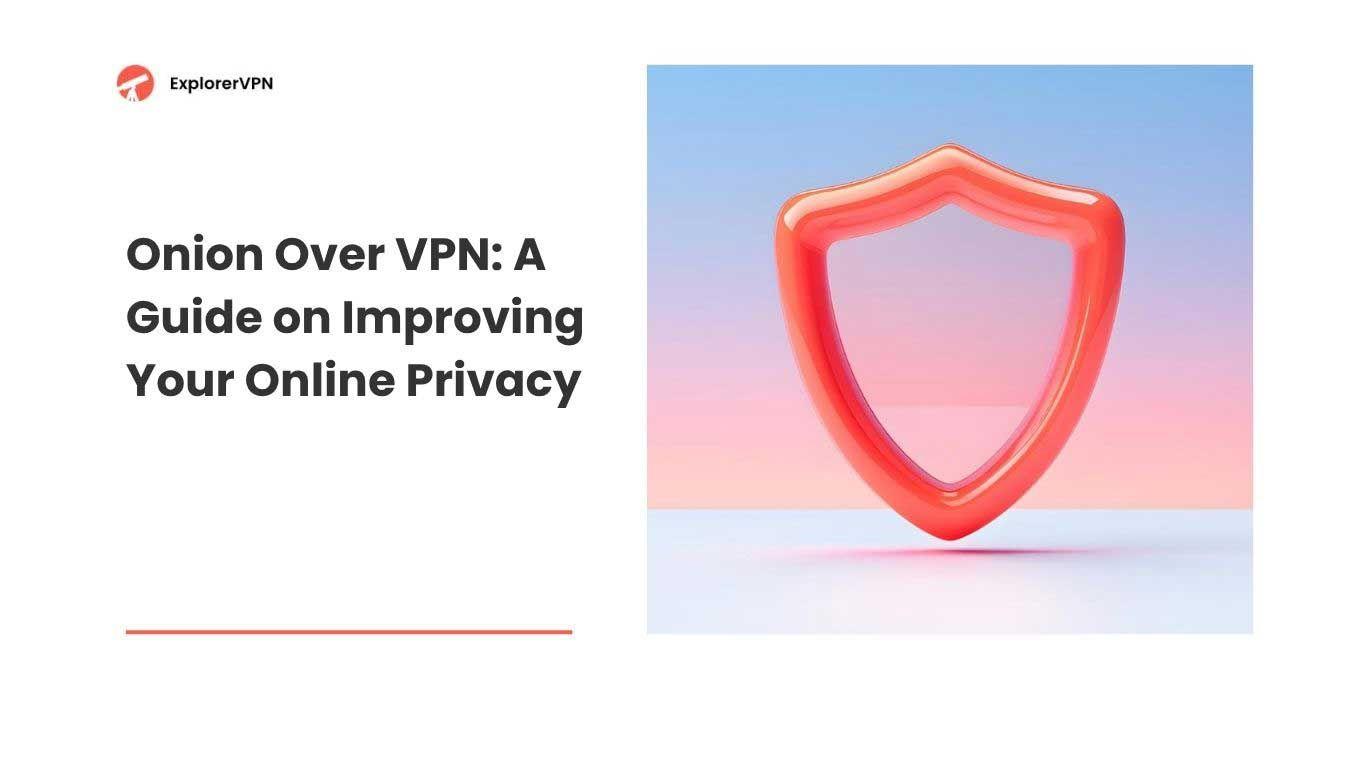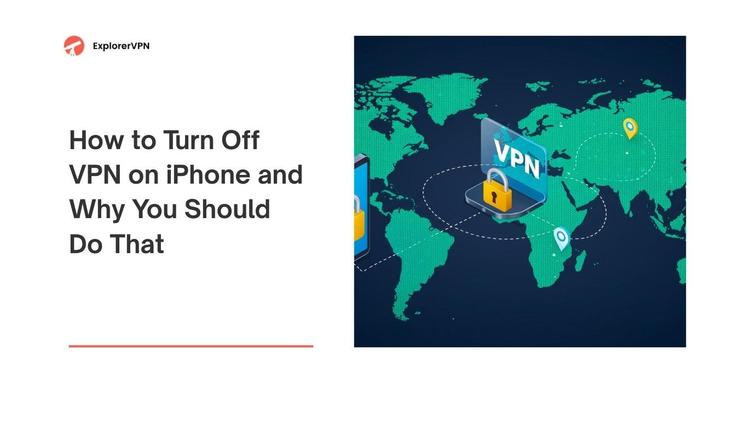Onion over VPN means connecting to a virtual private network (VPN) first, then accessing the Onion (Tor) network. It hides your IP from the Tor entry node and encrypts traffic through both services.
In this article, you'll learn what is onion over VPN, how it works, the difference between Tor over VPN and VPN over Tor, and when and why you should use it. We'll also cover tools like NordVPN onion over VPN, the safety, speed, legality, and setup of this method, along with a comparison to double VPN and when you may not need it.
What is Onion Over VPN?
Onion over VPN is when you first connect to a VPN server, and then your internet traffic is routed through the Tor network. It’s like wearing two layers of security. The VPN encrypts your data and hides your actual IP address from the Tor network, and the Tor network further anonymizes your traffic by routing it through multiple volunteer operated servers called nodes.
Such a combination gives an extra layer of encryption and, of course, privacy. VPN encrypts the traffic before it enters the Onion network, which is also encrypted in layers and bounces through nodes across the world. So, even your internet service provider (ISP) cannot see you're using Tor.
Some VPN services make it easy to use this method by offering specialty servers called Onion over VPN servers directly in their app. With a single click, your traffic is protected through a VPN and routed into the onion network without needing a separate Tor browser right away.
How Does the Onion Network Work?
The Onion network, also called Tor (The Onion Router), is a privacy-focused system that routes your internet traffic through multiple nodes. When you connect to Tor, your data passes through three main stages: entry node, relay node, and exit node.
Each time data moves from one node to another, it gets decrypted one layer at a time, like peeling an onion. Your original IP address is hidden, and only the final exit node can see your web request, but not your IP or identity. That’s why onion sites (websites ending in .onion) are accessible only through the Tor browser.
The system was originally built for government-level communication, but now anyone who wants privacy and protection from surveillance or censorship can use it. If you're trying to connect through different locations for anonymity or content access, you can even change VPN location before entering the Tor network.
Who Should Use Onion Over VPN?
People who value extreme privacy should consider Onion over VPN. This includes journalists, whistleblowers, activists in authoritarian countries, or anyone who needs to hide their online activity. Using Onion over VPN protects against tracking, traffic analysis, and censorship.
It’s also great for people using public Wi-Fi or accessing onion websites. Even regular users who just want increased privacy and secure browsing can benefit. For example, if you’re using a VPN for TikTok or a VPN for snapchat, you might also want to add extra security if you're worried about being monitored or flagged.
If you're accessing sensitive information or trying to avoid restrictions, the combo of a VPN and Onion routing is extremely powerful.

onion over vpn vs vpn over tor
VPN Over Tor vs. Onion Over VPN - What’s the Difference?
They sound similar but they are different. Let’s see how:
What Is Onion Over VPN (Tor Over VPN)?
Onion over VPN, also known as Tor over VPN, is when you connect to a VPN and then to the Tor network. Your internet traffic is encrypted by the VPN before it hits the onion network.
Your ISP only sees you connected to a VPN, not that you’re using Tor. This setup also allows you to access .onion websites using a separate Tor browser. It’s the common and recommended setup, especially with services like Onion over VPN NordVPN which have dedicated servers for this.
What Is VPN Over Tor?
VPN over Tor is the opposite. You connect to the Tor network, then route your traffic through a VPN. This is harder to set up and supported by very few VPN providers.
It might help you access websites that block Tor exit nodes, but it comes with major downsides. For example, since your traffic exits the Tor network unencrypted before entering the VPN, your original data could still be exposed if you’re not careful. Also, your VPN provider could see your real IP, which defeats the purpose of using Tor.
Which of Those Is Better?
In most cases, Onion over VPN is safer, simpler and more private. It hides your Tor usage from your ISP, protects you from malicious Tor exit nodes and is easy to use with a VPN service that has onion routing as a feature.
VPN over Tor is rarely needed and is mostly used by advanced users. For the average person looking for more privacy, Onion over VPN is the better and more practical option.
Onion Over VPN vs. Double VPN
Both Onion over VPN and double VPN boost your online privacy, but they do it differently.
How Double VPN Works?
Double VPN routes your traffic through two VPN servers instead of one, giving it double encryption. For example, double VPN, you might conect through a server in the UK first, then in Germany. This makes your data harder to trace and is useful when using services like VPN for Whatsapp or trying to get VPN for cheaper flights while traveling.
How Onion Over VPN Is Different?
Onion over VPN sends your traffic through a VPN server and then into the Tor network. This setup allows access to onion websites and adds an additional layer of anonymity with multiple Tor nodes.
Which One Should You Use?
Double VPN offers strong encryption and is ideal for general privacy. But if you want access to the onion network or need advanced anonymity, Onion over VPN is better. Just keep in mind both methods can slow your connection, important to consider if you're gaming with a pubg VPN or VPN for free fire.
Why Do You Need Onion Over VPN?
There are many reasons you might need Onion over VPN, here’s a few:
- Your ISP or government blocks access to the Tor network.
- You want to hide Tor usage from your ISP.
- You want protection from malicious Tor exit nodes.
- You need access to onion websites
- You handle sensitive information or whistleblow.
- You’re in a high-surveillance area.
VPN encrypts your web traffic and hides your original IP address. Tor adds multiple nodes for anonymity. Together, they create a powerful combo for online privacy and protection. If you're having issues while connecting to the VPN, here's a helpful post on VPN not connecting
Should I Always Use a VPN With Tor?
Not necessarily. Tor works by itself and is already anonymous. But using a VPN adds an extra layer of encryption and hides the fact that you’re using Tor.
Without a VPN, your ISP sees you're connecting to the Tor network, which might be suspicious in some places. If you use Onion over VPN, the ISP only sees VPN traffic, not Tor traffic.
Still, using both can slow down your connection. For casual users, Tor alone may be enough. But for increased privacy, a VPN is highly recommended.
Some people use VPNs to access restricted content like VPN for Mobile Legends or other apps. If you’re already doing that, combining it with Onion over VPN can further protect your identity.
When Should You Use Tor Browser?
You should use the Tor browser when you want to browse anonymously, access blocked content, or visit onion websites. It’s useful in countries with internet censorship, or when researching sensitive topics.
If you’re accessing onion sites, only the Tor browser works. Even with a VPN, regular browsers won’t open .onion domains.
You should also use it when you don’t want to be tracked by websites, advertisers, or governments. If you’re trying to stay anonymous online, a separate Tor browser combined with a VPN is one of the best options.
How to Use Onion Over VPN?
Using Onion over VPN can be simple. Here’s how:
- Subscribe to a VPN service that supports Onion over VPN.
- Download and install the VPN app.
- Open the app and connect to one of their Onion over VPN specialty servers.
- Once connected, your internet traffic is automatically routed through the Tor network.
- You can now open your regular browser or a separate Tor browser to access onion websites or surf anonymously.
If you're based in a specific region like Georgia or California, connecting through Atlanta VPN, California VPN, or even Los Angeles VPN can give you localized access before entering the Tor network.
Can Onion Over VPN Hide Tor from My ISP?
Yes. That’s one of the main reasons people use this method. When you use Onion over VPN, your ISP sees only that you’re connected to a VPN. They can’t see that you’re also using Tor.
This is especially helpful in countries or schools where Tor usage is blocked or monitored. It protects you from being flagged or tracked just for using the Tor network.
Is Onion Over VPN Slow?
Yes, it’s usually slower than regular VPN or normal internet browsing. That’s because your data passes through a VPN server and multiple nodes in the Tor network. Each hop and encryption layer adds latency.
If you're using Onion over VPN with the Tor browser and accessing onion sites, expect slower connection speeds. But for increased privacy, the speed trade-off is often worth it. Some users looking for faster options might try tools like ChatGPT VPN, but those won’t give the same level of anonymity.
Is Onion Over VPN Safe?
Yes, if used right. The VPN encrypts your traffic before it hits the Tor network. This protects against malicious exit nodes that can spy on unencrypted traffic. It also hides your original IP from the Tor entry node.
But be careful. Don’t log in to personal accounts or give away identifying info while using the Tor network. Like any tool, your own behavior matters.
Also, make sure to use a reliable VPN provider that supports Onion over VPN and has a no-logs policy. That way your internet traffic is better protected.

is onion over vpn legal
Is the Onion Browser Legal?
Yes, the Tor browser is legal in most of the countries, including the US and EU. Despite this, some countries, like China or Iran, block Tor.
Remember, the browser itself is legal but using it for illegal activities is not. Accessing regular websites through Tor is fine and even government agencies use it for secure communication.
When Don’t You Need Onion Over VPN?
You probably don’t need Onion over VPN if:
- You’re just browsing regular websites.
- You don’t care about your ISP knowing your activity.
- You’re not accessing sensitive data or onion websites.
- You need faster internet speed.
In these cases, a regular VPN is usually enough. If you're curious about the differences between privacy tools, check out the difference between Proxy vs VPN.
Onion over VPN combines two powerful privacy tools: a VPN and the Onion (Tor) network. This method gives strong online privacy by hiding your IP from both your ISP and the Tor network. It also protects you from surveilance, censorship, and tracking. While it’s not the fastest option, it’s perfect for people who need extreme privacy and access to onion websites.
Just remember that security isn’t just about tools, it’s also about how you use them. For example, if you're ever using a VPN on your phone and need to disable it at all, here's how to turn off VPN on iPhone. Stay smart, safe, and choose the best VPN service for your needs.








